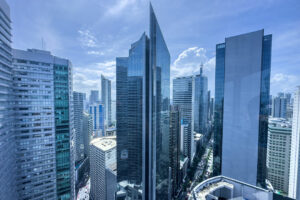
Philippines is one of the most hybrid-work friendly markets in Asia-Pacific

THE PHILIPPINE office sector is one of most hybrid work-friendly markets in the Asia-Pacific region, but some firms still face sustainability challenges, according to property consultancy firm Colliers Philippines.
In a survey conducted under its 2026 Asia Pacific Workplace Insights Report, Colliers said that 82% of Philippine organizations are adopting hybrid work models, with 32% looking to invest in workplace upgrades next year.
“Occupiers in the Philippines are moving beyond cost-efficiency to create workplaces that inspire, connect, and deliver lasting value,” Kevin Jara, head and director of office services — tenant representation at Colliers Philippines, said in a statement.
However, 26% of respondents from the Philippines said they are unsure about their sustainability approach, Colliers noted, citing the need for clearer strategies and landlord collaboration.
“While ESG (environmental, social, and governance) priorities remain a work in progress, today’s momentum signals meaningful progress. Indeed, the role of the workplace has evolved from a functional necessity to a strategic driver of culture, collaboration, and productivity,” Mr. Jara said.
Firms that align ESG principles with their workplace strategy could help boost company branding, Colliers said.
Key sustainability practices that offices should adopt include green building design, inclusive layouts, and transparency, it added.
Despite the growing shift to hybrid work, many organizations in the Philippines, Australia, Japan, Singapore, and New Zealand are still enforcing attendance mandates, Colliers noted.
“Attendance mandates remain common, highlighting the region’s ‘hybrid paradox,’ where flexibility exists on paper but traditional structures persist,” Colliers said.
It also noted that assigned seating is still prevalent in many Philippine workplaces, signaling limited agility in office setups.
“Even in flexible offices, early arrivals often claim the same seat. At the same time, some senior leaders are growing quite resistant to hybrid, implying concerns about productivity, collaboration, and culture,” Chris Archibold, Colliers managing director for Offices in Southeast Asia, said in the report.
“Hybrid isn’t a quick fix, it requires clarity, honesty and a deep understanding, of what works for your people, your business, and your market,” he added.
The report also noted that 43% Philippine organizations have already integrated multi-generational needs into their workplace strategies.
“Overall, the Philippines shows strong progress in hybrid adoption and inclusivity, coupled with planned investments. Closing gaps in sustainability and aligning flexibility with culture will be critical for Philippine-based organizations who seek to attract talent and drive long-term performance,” Colliers said.
Across the Asia-Pacific, companies’ work strategies focus on improving productivity (9.43%), talent attraction/retention (8.85%), improving employee experience or well-being (8.48%), and better location (8.11%).
About 74% of firms in the region said that their offices are at least half full on a typical work day, while 45% said their midweek occupancy exceeds 75%, Colliers said.
For design preferences, Asia-Pacific respondents also noted that they prefer workplaces with natural lighting (17%), biophilic features and green walls (15%), ambient temperature (14%), and more collaboration spaces (13%).
About 20% of the region’s firms use artificial intelligence (AI)-driven tools to enhance employee experience, while 20% have no AI integration plans, Colliers said.
“AI has the potential to make workplaces more responsive, adjusting layouts in real-time, tailoring sensory inputs and tracking usage to better align with how people work,” it said in the report.
Colliers surveyed more than 800 corporate occupiers across 11 Asia-Pacific markets, including the Philippines, China, Australia, India, Indonesia, Japan, New Zealand, Singapore, Taiwan, Hong Kong, and South Korea. — Beatriz Marie D. Cruz



